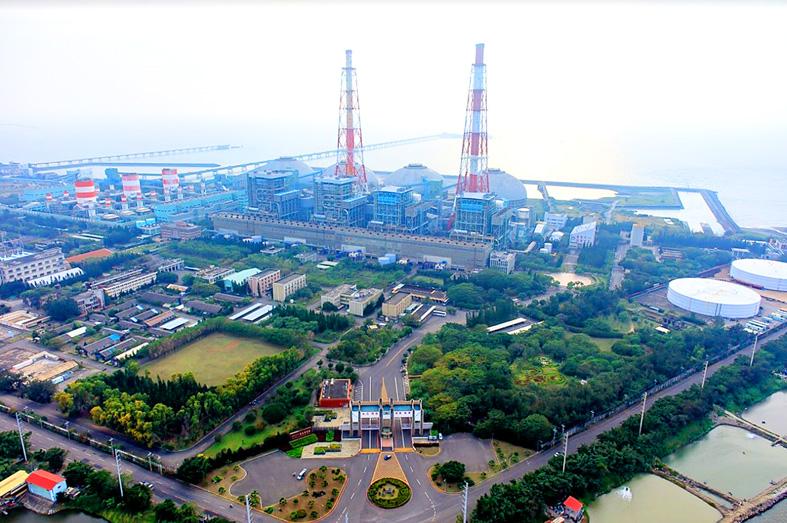All four coal-fired generators at the Sinda Power Plant (興達電廠) are to be phased out over the next five years and replaced with natural gas-powered units, the Ministry of Economic Affairs said on Sunday, amid protests over air pollution in Kaohsiung.
Taiwan Power Co (Taipower, 台電) plans to decommission all four coal-fired generators at the Sinda Power Plant within five years, the ministry said in a statement.
The No. 1 and 2 coal-fired generators are scheduled to be decommissioned in 2023 and replaced with natural gas-powered ones, it said.

Photo: Chen Wen-chan, Taipei Times
The No. 3 and 4 generators would be reserved for emergency use after the new natural gas-powered units go online in 2024, and then decommissioned by the end of 2025, it added.
Over the past five years, state-owned Taipower has been working to reduce the use of coal at the Sinda plant by more than 2 million tonnes, or 34 percent, compared with 2016, the ministry said.
On Sunday, demonstrators in Kaohsiung called for the coal-fired generators at the Sinda plant to be decommissioned immediately, saying they had been a major source of air pollution in the city for decades.
Environmental groups also called on Kaohsiung-based China Steel Corp (CSC, 中鋼), Taiwan’s leading steel maker, to close at least one of its boilers as soon as possible.
CSC said in a statement that only three of its 12 boilers are partly coal-powered, and one of them is not in use, while the other two would stop using coal by Sept. 15, in line with the Kaohsiung City Government’s coal consumption regulations.

Taiwan’s rapidly aging population is fueling a sharp increase in homes occupied solely by elderly people, a trend that is reshaping the nation’s housing market and social fabric, real-estate brokers said yesterday. About 850,000 residences were occupied by elderly people in the first quarter, including 655,000 that housed only one resident, the Ministry of the Interior said. The figures have nearly doubled from a decade earlier, Great Home Realty Co (大家房屋) said, as people aged 65 and older now make up 20.8 percent of the population. “The so-called silver tsunami represents more than just a demographic shift — it could fundamentally redefine the

Businesses across the global semiconductor supply chain are bracing themselves for disruptions from an escalating trade war, after China imposed curbs on rare earth mineral exports and the US responded with additional tariffs and restrictions on software sales to the Asian nation. China’s restrictions, the most targeted move yet to limit supplies of rare earth materials, represent the first major attempt by Beijing to exercise long-arm jurisdiction over foreign companies to target the semiconductor industry, threatening to stall the chips powering the artificial intelligence (AI) boom. They prompted US President Donald Trump on Friday to announce that he would impose an additional

China Airlines Ltd (CAL, 中華航空) said it expects peak season effects in the fourth quarter to continue to boost demand for passenger flights and cargo services, after reporting its second-highest-ever September sales on Monday. The carrier said it posted NT$15.88 billion (US$517 million) in consolidated sales last month, trailing only September last year’s NT$16.01 billion. Last month, CAL generated NT$8.77 billion from its passenger flights and NT$5.37 billion from cargo services, it said. In the first nine months of this year, the carrier posted NT$154.93 billion in cumulative sales, up 2.62 percent from a year earlier, marking the second-highest level for the January-September

Asian e-commerce giant Shein’s (希音) decision to set up shop in a historic Parisian department store has ruffled feathers in the fashion capital. Anger has been boiling since Shein announced last week that it would open its first permanent physical store next month at BHV Marais, an iconic building that has stood across from Paris City Hall since 1856. The move prompted some French brands to announce they would leave BHV Marais, but the department store had already been losing tenants over late payments. Aime cosmetics line cofounder Mathilde Lacombe, whose brand was among those that decided to leave following